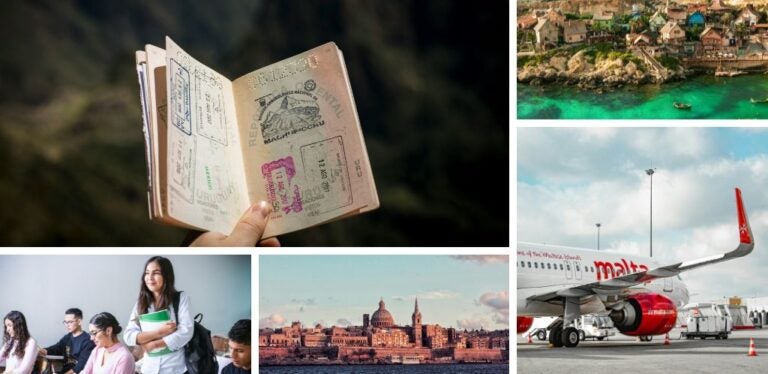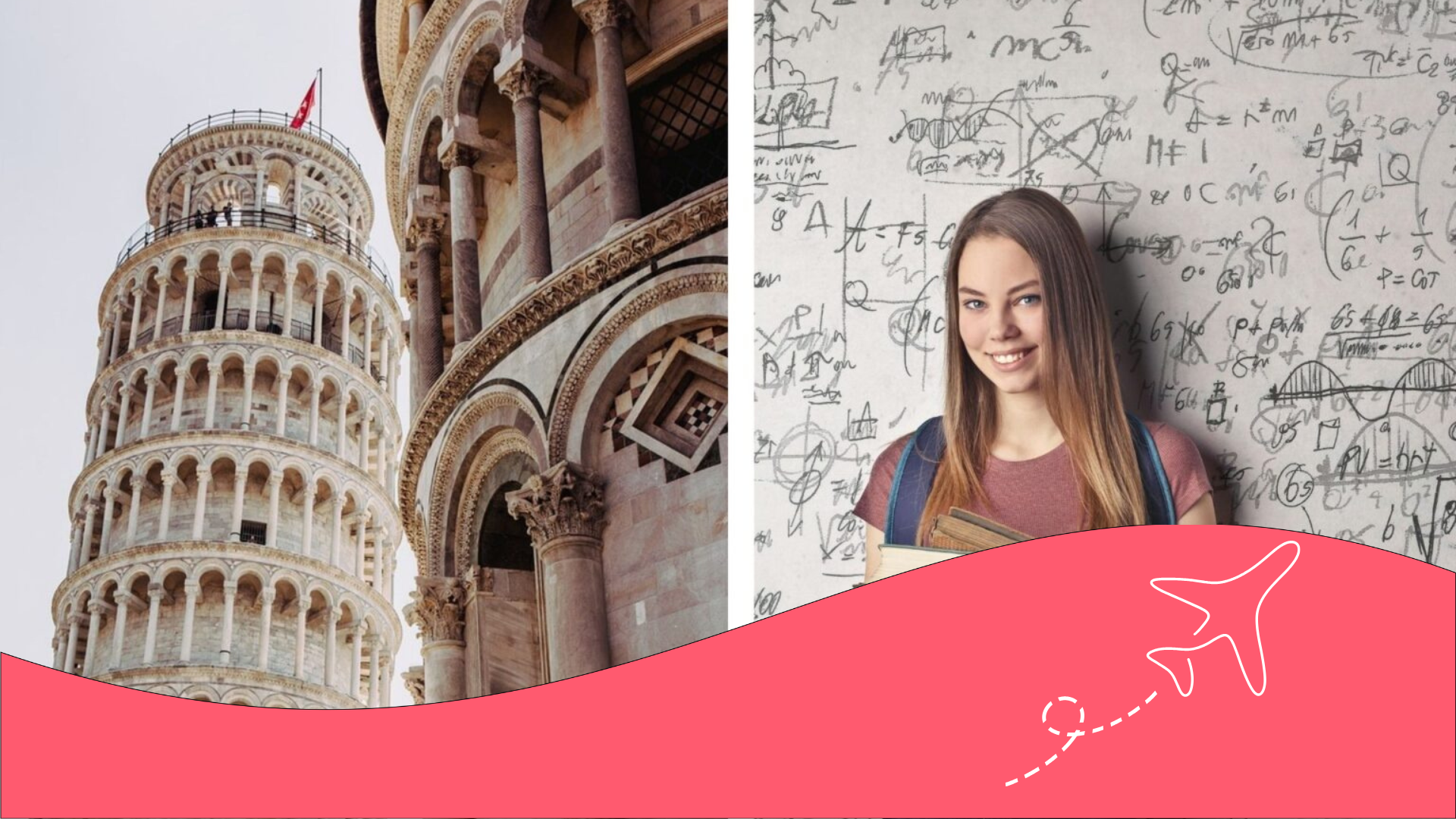How to study in Malta as an international student?
We tell you how to study in Malta as a foreigner. Do you need a visa? What are the requirements? Find all the answers here.
Thinking about moving to Malta to study? You’re not alone. This small Mediterranean country has become a popular destination for international students, thanks to its high quality of life, strong education system, and the opportunity to study in English. Last year, over 3,700 students from abroad enrolled at its main university — that’s 25% of the total student body! But how can you study in Malta as an international student? What are the requirements? And how much would it cost?
To help clear up your doubts, we’ve put together a guide with everything you need to know before applying and why you should study in Malta. We’ll break down the country’s education system and admission requirements, and we’ll also cover how to prepare for your move and what costs to expect. Let’s get started so you can begin planning your new life as soon as possible.
How does the education system work in Malta?
Before you dive into the adventure of studying in Malta, it’s a good idea to understand how the education system works. It follows the European model and is divided into several levels: primary, secondary, and higher education.
When it comes to higher education, Malta offers several options. First, there’s the public University of Malta, where most undergraduate programs last between three and four years. Master’s degrees typically take one to two years to complete. Another path is through technical and vocational courses — a great choice for those looking for more hands-on training with a focus on the job market. These programs are offered at institutes, private centers, and institutions like the Malta College of Arts, Science & Technology (MCAST).
One of the biggest draws of this Mediterranean archipelago for international students is the chance to study in English. Nearly all universities and institutions offer their programs in the language, and there are specialized English schools everywhere you look.
| Level of education | Duration | Description | Languages of study |
| Primary and secondary education | 12 years | Compulsory education until the age of 16, with the possibility of continuing until the age of 18 to access higher education. | English and Maltese |
| Technical and vocational training | 6 months – 2 years | Education focused on job placement with courses in areas such as business, health, technology and tourism. | English |
| University degree | 3-4 years | Academic programs in various disciplines, with the option of specialization and internships in companies. | English |
| Master’s degree | 1-2 years | It can be professional or research, with a focus on advanced specialization. | English |
| Doctorate | 3-4 years | Advanced research programs with the possibility of funding for students. | English |
As you can see, Malta’s education system has several routes to suit different student profiles.
Requirements to study in Malta as a foreigner
Studying in Malta isn’t as simple as just enrolling in the program of your choice. You’ll need to meet certain requirements to be accepted and to live in the country legally. Knowing what’s expected ahead of time will help you get everything in order and avoid any last-minute issues. We’ve put together a list of the key requirements so you can start preparing early:
- Acceptance letter: The first step is getting accepted into an accredited university or educational institution. Make sure to keep an eye on deadlines and requirements so you can submit your application on time.
- Student visa or residence permit: If your course lasts more than 90 days and you’re from outside the European Union (EU) or the European Economic Area (EEA), you’ll need to apply for a student visa or a residence permit. The process can take anywhere from 4 to 8 weeks, so just like with your enrollment, it’s important to keep track of deadlines to avoid any last-minute stress.
- Valid passport: Your passport will need to be valid for the duration of your stay in Malta.
- Proof of language proficiency: If your course is in English, you may need to prove your language level with tests like IELTS, TOEFL, or Cambridge. Some universities might require a specific certification, so be sure to check their individual criteria.
- Academic documentation: You’ll need to submit certified and translated copies of your previous diplomas and academic records. In some cases, these documents may also need to be officially recognized before they can be accepted.
- Economic justification: To get a student visa, the Maltese government requires proof that you have enough funds to support yourself during your stay. This can include bank statements, scholarship letters, or sponsorship documents.
- International medical insurance: All international students are required to have health insurance that covers medical and hospital care during their stay in Malta.
- Proof of accommodation: You will also need to provide a reservation of accommodation or a letter of invitation certifying where you will be residing.
- Airline tickets: Having a return ticket out of the country may be a requirement for some visas.
- Criminal record certificate: Some universities, or even the visa process itself, may require a police clearance certificate to confirm you don’t have a criminal record.
Keep in mind that these are general requirements for studying in Malta. Individual universities may have additional criteria, so it’s a good idea to check their websites for specific details.
Steps to study in Malta as a foreigner
Now that you know the requirements for studying in Malta, it’s time to look at the actual process step by step. We’ll walk you through everything you’ll need to do—from the moment you decide Malta is your destination to the day you finally sit in a classroom there. Understanding each stage will make the journey feel less overwhelming and help you create your own timeline so you don’t fall behind on any deadlines. Let’s get started.
1. Evaluate universities and courses in Malta
The first step is deciding what you want to study and where. As we mentioned earlier when talking about the education system, Malta offers a wide range of options. Your choice will depend on your academic and career goals. If you’re looking for a more traditional academic path, the University of Malta is the way to go. On the other hand, MCAST (the Malta College of Arts, Science & Technology) and private institutions focus more on hands-on, technical training. The table below highlights the key differences between these two paths:
| University studies | Short courses | |
| Duration | 3-4 years for bachelor’s degrees, 1-2 years for master’s degrees | From a few weeks to 1 year |
| Cost | High annual tuition for international students, with scholarship options | Generally more affordable, though with fewer scholarship options |
| Languages available | Mostly in English, with some programs in Maltese. | High availability in English and specific courses in Maltese or Italian. |
| Main objective | In-depth academic training, with the possibility of specialization and access to research. | Development of practical skills to enhance professional profile |
| Entry requirements | More demanding: previous qualifications, English tests (IELTS, TOEFL), accreditations, etc. | Less demanding: in many cases, previous experience or intermediate English certification is sufficient. |
| Flexibility | Fixed structure with established schedules | More flexible: face-to-face, online and intensive options |
| Professional opportunities | Access to jobs in international companies, research and highly specialized sectors. | Fast-track option to improve skills, change sectors or increase employability |
Take your time before choosing a school. Explore their website to learn about the programs they offer, check the admission requirements, look at international rankings, and browse forums to see what former students have to say.
2. Review financing options for studying in Malta
Already decided what and where you want to study? Then it’s time to think about how you’re going to cover the costs. Tuition fees in Malta vary depending on the institution and program you choose. For international students, undergraduate degrees typically range from 6,000 to 15,000 euros ($6,200 to $15,500), while postgraduate programs can go over 20,000 euros ($20,600). If you need financial support, there are several options available:
- Scholarships to study in Malta: The Maltese government and some universities offer scholarships for international students. These programs may cover full or partial tuition, especially for postgraduate and research-focused studies.
- Student loans: Unlike Maltese citizens, international students aren’t eligible for government loans. However, you can look into options available in your home country or check with financial institutions that offer student loans.
- Private funds and sponsorships: Some organizations and foundations offer partial funding for international students in specific programs. Additionally, some universities allow you to pay in installments.
3. Applying for a study program in Malta
Once you’ve decided where you want to study and which program to pursue, you can begin the admission process. In countries like the Netherlands, there’s a centralized platform for handling applications—but that’s not the case in Malta. You’ll need to apply directly through the institution you’re interested in. While the specific requirements may vary depending on the university or school, you’ll most likely need to provide the following:
- Application form: Complete the document provided by the university or school of your choice.
- Certificates of previous studies: You’ll need to submit certified copies of your academic diplomas and transcripts, translated into English. In some cases, these documents may need to be officially recognized or validated beforehand.
- Language test: If the program is in English, you’ll need to prove your language proficiency with tests like IELTS, TOEFL, or Cambridge. Be careful though—some universities have specific minimum score requirements, so make sure to check the details.
- Cover letter: You will need to explain why you want to study in that program and what you can bring to the institution.
- Recommendation letters: Some graduate programs or specializations will ask for these letters.
- Application fees: Some universities charge an administrative fee to process your application. It varies by institution.
Important! Pay close attention to each university’s application deadlines. In general, submissions close between January and May for programs starting in September.
4. Applying for a visa to study in Malta
If you’re not a citizen of the European Union (EU) or the European Economic Area (EEA), you’ll also need to apply for a Maltese student visa or a residence permit. There are a few types of visas available:
- Student visa: This visa is for studying in Malta for more than three months. It’s valid for 12 months, can be renewed, and allows you to work up to 20 hours per week once you’ve secured a work permit.
- Schengen (tourist) visa: valid for short courses of up to 3 months. It does not allow to work or to reside in Malta in the long term.
When you apply for your student visa, you’ll need to provide an acceptance letter from an educational institution, proof of financial means, international health insurance, and confirmation of accommodation. There’s also a 70 euros ($75) application fee. The process can take anywhere from 4 to 8 weeks, so make sure to plan ahead and keep an eye on the deadlines.

5. Moving to Malta
You’re almost all set to start your studies in Malta! Now it’s time to start planning your move and getting ready for life there. To make your arrival smoother, it’s a good idea to sort out a few key things in advance. Here’s what you should look into:
- Accommodation: In cities like Valletta and Sliema, rent can be quite high. A one-bedroom apartment in the city center typically costs between 700 and 1,300 euros ($755–1,400) per month. Outside the center, prices drop to around 600–1,000 euros ($650–1,080). If you’re looking for a more budget-friendly option, student housing is a good choice—shared rooms can go for about 300 euros ($325) a month. Websites like Flatmates, Domain, or rent.com.au can help you with your search.
- Transportation: Buses are the main form of public transport in Malta. A monthly pass costs around 30 euros ($32) and lets you travel easily across the island. Many areas are also walkable or bike-friendly, making it simple to get around without a car.
- Local customs: There are a few cultural differences that might catch you off guard. Take mealtimes, for example—lunch is usually light and eaten between 12:00 and 1:00 PM, while dinner tends to be early, around 6:00 to 7:00 PM. As for store hours, many shops open from 9:30 AM to 1:00 PM, then close for a break and reopen from 4:00 to 7:00 PM.
Also, make sure you have all your important documents easily accessible before you board your flight. Having everything organized will make your arrival a whole lot smoother.
6. Connectivity in Malta
To wrap up your moving plans, it’s also important to think about how you’ll stay connected once you arrive. Sorting this out in advance will make it easier to handle paperwork, stay in touch with your school, and keep in contact with friends and family.
If you don’t want to risk losing internet access at any point, we recommend checking out Holafly Plans. You’ll be online the moment you land—no need to search for a local SIM card or rely on public Wi-Fi. Plus, if you decide to explore other European destinations during your stay, your data will still work in over 170 countries.
The service has several plans. Choosing one or another will depend on your needs (you can change or cancel at any time):
- 10 GB plan: Choose this one if you are going to use it for basic tasks, such as browsing, mails and maps. The monthly fee is 39.90 euros ($40.93).
- 25 GB Plan: If you want to make video calls with your family and friends, this is a better option. It is priced at 49.90 euros ($51.19) per month.
- Unlimited plan: Select this plan if you need to secure your connection at all times and do not want to be aware of how much data you are spending. Like the 25 GB plan, it can be used on several devices. Its price is 64.90 euros ($67.90) per month.
Important: If you are a frequent traveler and want to stay connected without worrying about expensive roaming or looking for a new SIM at every destination, Holafly’s subscription plans are for you. With a single eSIM, enjoy internet in more than 170 countries for a fixed price and no surprises on your bill. Travel without limits and connect easily and securely! 🚀🌍

When and how to homologate degrees and courses in Malta?
You may need to have your degrees recognized. Without this procedure, you will not be able to access undergraduate or graduate programs at a Maltese higher education institution.
In Malta, the body responsible for evaluating and recognizing academic qualifications is the Malta Qualifications Recognition Information Centre (MQRIC). It operates under the National Commission for Further and Higher Education (NCFHE) and ensures that foreign qualifications align with the local education system. To apply, you’ll need to submit:
- Certified copy of your academic degree.
- Transcripts translated into English, with details of subjects taken and credits obtained.
- Description of the program of studies, including time load and content of the subjects.
- Valid passport or ID card.
- Proof of English level.
The cost depends on the institution and the level of study, but you can expect to pay between 150 and 600 euros ($160–650). Keep in mind that the process can take anywhere from six weeks to three months, so don’t wait—start early to avoid delays.
How much does it cost to study in Malta as a foreigner?
One important thing to consider before making the move is how much studying in Malta is actually going to cost you. The truth is—it depends. We can’t give you an exact number, since expenses can vary quite a bit depending on the city, the type of institution, and your personal lifestyle. But we can give you a rough idea of what to expect.
Academic costs in Malta
As elsewhere, tuition fees vary depending on the school and program chosen. In general, expect to pay:
- University degrees: Between 1,080 euros and 1,360 euros ($1,160-1,460) per semester.
- Postgraduate courses and master’s degrees: Prices may be higher, depending on the specialization.
- Short courses and certifications: Fees vary according to duration and area of study.
Cost of living in Malta
As we said, the cost of living in Malta will depend a lot on the city or town you live in and your daily habits. Here are some reference costs:
| Cost in € | Cost in $ USD | |
| Accommodation (room in shared apartment) | 300-500 | 325-540 |
| Transportation (monthly pass) | 30 | 32 |
| Food | 200-300 | 215-325 |
| Utilities | 50-100 | 55-110 |
| Other expenses (leisure, gym, etc.) | 50-100 | 55-110 |
| Estimated monthly total | 630-1,030 | 680-1,115 |
Study online in Malta as a foreigner
Interested in studying at a Maltese institution but can’t make the move? You’ve still got options! While online courses aren’t as widely available as in some other countries, there are programs you can take remotely. Here are a few to consider:
- University of Malta: Offers online courses in various disciplines. They are usually in mixed modality.
- Malta Institute of Tourism Studies (ITS): Distance learning in tourism and hotel management.
What do you need to get into these programs? Pretty much the same requirements as for on-campus study—translated academic transcripts in English and proof of your English level, like an IELTS, TOEFL, or Cambridge exam.
If you go for one of these programs, you’ll save on housing and everyday expenses. It also gives you more flexibility with your schedule—and you won’t need a student visa to study in Malta. That said, there are some trade-offs: less face time with professors and classmates, and you’ll need to be extra disciplined and well-organized.
Frequently asked questions about studying in Malta as a foreigner
Costs vary depending on the program and the university. For undergraduate degrees, tuition typically ranges from 1,080-1,360 euros per semester ($1,160 to $1,460). Short courses and certificate programs tend to have more flexible pricing
Yes, most university programs and courses in Malta are taught in English. To get in, many institutions will ask for proof of your language skills through tests like IELTS, TOEFL, or Cambridge.
If you’re an EU citizen, you won’t need a visa. But if you’re from outside the EU and planning to study in Malta in person, you’ll need to apply for a student visa. If you’re studying online from your home country, there’s no visa required.
Yes. If you have a student visa, you will be able to work up to 20 hours per week after completing the first three months of your course.
Bachelor’s degrees in Malta typically take three to four years to complete, depending on the program and the university. Master’s programs usually last one to two years, while PhDs can take anywhere from three to five years.





 Language
Language 


















 No results found
No results found







